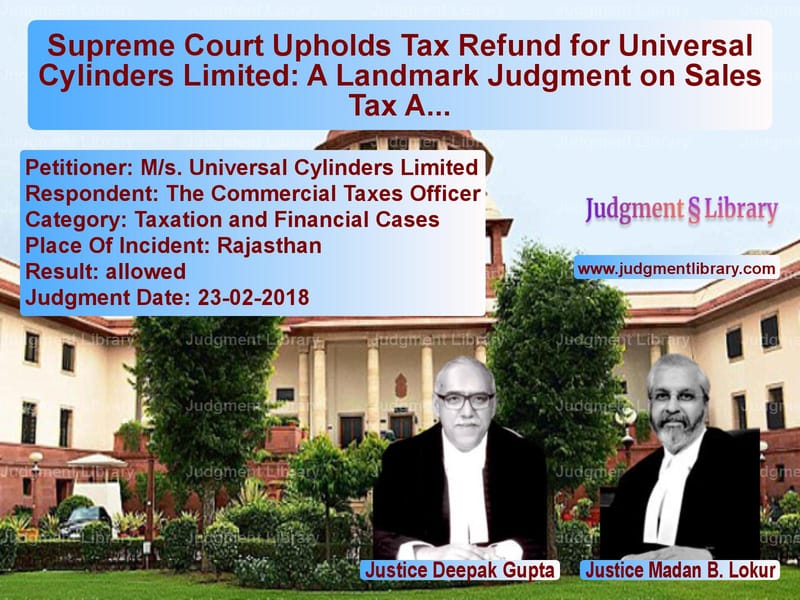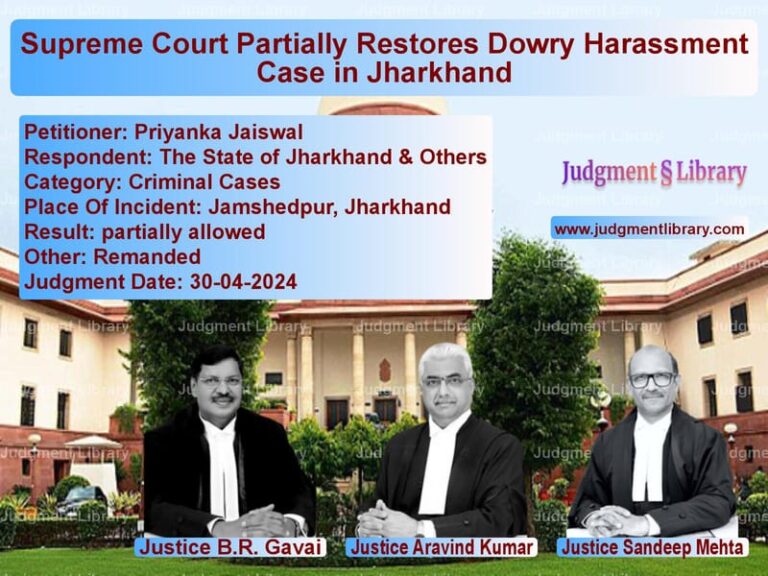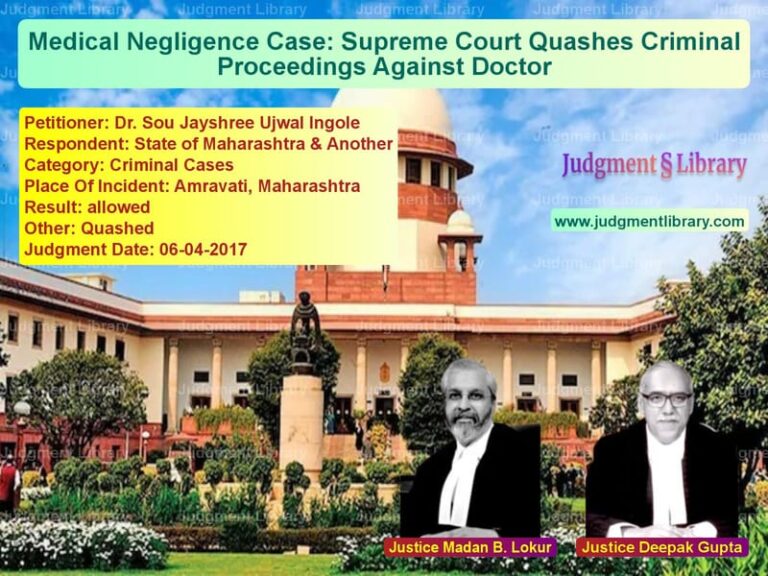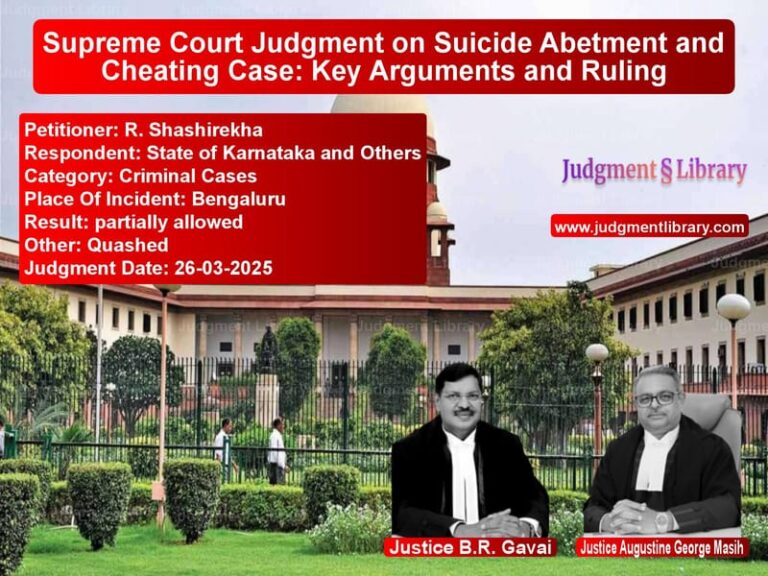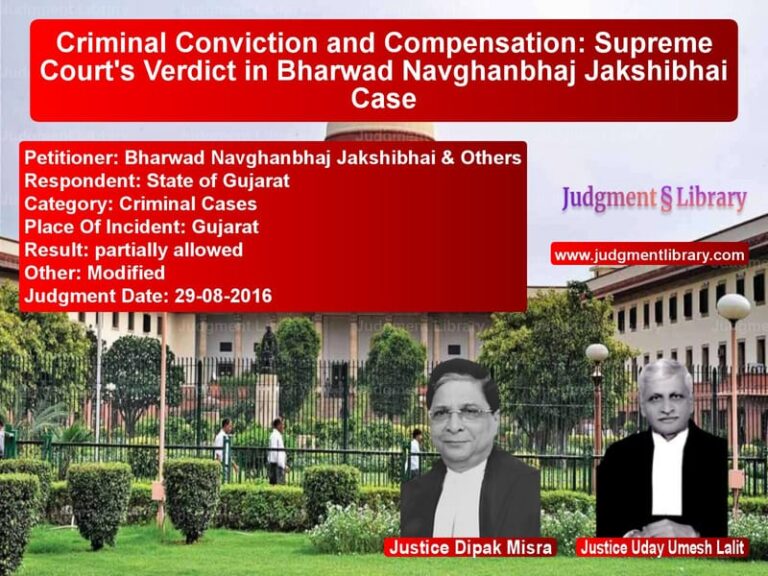Supreme Court Upholds Tax Refund for Universal Cylinders Limited: A Landmark Judgment on Sales Tax Adjustments
The case of M/s. Universal Cylinders Limited vs. The Commercial Taxes Officer deals with an important issue of sales tax refund when prices are revised retrospectively. The appellant, Universal Cylinders Limited, was engaged in manufacturing and supplying LPG cylinders to government-owned oil companies. The dispute arose when the company initially charged sales tax on a higher provisional price but later had to refund part of the amount after the government revised the price downward. The company sought a refund of the sales tax paid on the excess amount, but the tax authorities denied it, leading to legal proceedings that ultimately reached the Supreme Court.
The Supreme Court, in this significant ruling, examined the provisions of the Rajasthan Sales Tax Act, 1994, and provided clarity on what constitutes the actual sale price for tax purposes. The Court ruled that when prices are controlled by a government agency and subsequently revised, the tax liability should be based on the final approved price rather than the provisional one. This judgment has far-reaching implications for businesses dealing with regulated pricing mechanisms.
Background of the Case
Universal Cylinders Limited manufactures LPG storage cylinders and supplies them to public sector oil companies like Indian Oil Corporation (IOC), Bharat Petroleum Corporation Ltd. (BPCL), and Hindustan Petroleum Corporation Ltd. (HPCL). The price of these cylinders is determined by the Ministry of Petroleum and Natural Gas (MoP&NG), which periodically reviews and revises the rates based on market conditions and policy decisions.
In 2000, IOC placed an order for 73,380 LPG cylinders at a provisional price of Rs. 682 per cylinder. The purchase order clearly stated that the final price would be determined by MoP&NG. Universal Cylinders Limited, in compliance with tax laws, charged sales tax on this provisional price and completed the supply.
However, on October 31, 2000, IOC issued a letter informing Universal Cylinders Limited that the price had been revised downward to Rs. 645 per cylinder, effective retrospectively from July 1, 1999. As a result, the oil companies deducted the excess amount of Rs. 37 per cylinder from future payments. Since the company had already paid sales tax on the higher provisional price, it sought a refund of the tax paid on the excess amount.
Legal Dispute and Arguments
Arguments by the Petitioner (Universal Cylinders Limited)
The appellant argued that since the final price had been reduced to Rs. 645 per cylinder, the excess Rs. 37 per cylinder was effectively returned to the oil companies. Therefore, the sales tax originally paid on the excess amount should also be refunded. The key arguments made by the appellant were:
- The sales tax was paid on the provisional price, which was later revised by the government.
- The final price determined by MoP&NG should be considered the actual sale price for tax calculation.
- The turnover should be adjusted based on the revised price since the excess amount was not ultimately received by the company.
- Denial of refund would lead to unjust enrichment of the tax authorities at the expense of the assessee.
Arguments by the Respondent (Commercial Taxes Officer)
The Revenue department opposed the refund claim, contending:
- There was no provision under the Rajasthan Sales Tax Act, 1994, for adjusting or refunding tax once it had been paid.
- The agreement between Universal Cylinders Limited and the oil companies was a private arrangement and had no bearing on tax assessment.
- Since the company initially received Rs. 682 per cylinder, this should be considered the sale price, and no refund should be granted.
Supreme Court’s Analysis and Judgment
The Supreme Court examined the definitions of ‘sale price’ under Section 2(39) and ‘turnover’ under Section 2(44) of the Rajasthan Sales Tax Act, 1994. The Court noted:
“The sale price is the amount actually paid or payable to a dealer as consideration for the sale. Any sum allowed as a discount or rebate according to the practice prevailing in the trade must be deducted from the sale price.”
The Court reasoned that since the final price was determined by MoP&NG, which had complete control over the pricing structure, the company was legally entitled to only Rs. 645 per cylinder. The key observations of the Court were:
- The price revision was part of a government-controlled mechanism, not a voluntary discount.
- The company refunded Rs. 37 per cylinder to the oil companies, making Rs. 645 the actual price received.
- The tax should be levied on the final price set by the government and not on the provisional price.
- Denying the refund would amount to taxing an amount that was never retained by the company.
Important Precedents Considered
The Court referred to past judgments to support its decision:
- IFB Industries Ltd. v. State of Kerala (2012): The Court held that to claim a trade discount as an exemption, an assessee must prove that the purchaser had paid only the reduced price.
- ONGC v. State of Gujarat (2014): The Gujarat High Court ruled that discounts that form part of price agreements should not be included in the sale price for tax purposes.
- GAIL India Ltd. v. State of M.P. (2014): The Madhya Pradesh High Court held that when a final price is determined by a government body, the tax should be levied based on that price rather than a provisional one.
Final Ruling
The Supreme Court overturned the judgment of the High Court and ruled in favor of Universal Cylinders Limited. The Court directed the tax authorities to refund the sales tax paid on the excess amount of Rs. 37 per cylinder. Additionally, the Court awarded interest at 9% per annum on the refunded amount, payable from the date of the Deputy Commissioner’s order until the payment is made.
Implications of the Judgment
This ruling is a significant victory for businesses dealing with regulated pricing. The key takeaways from this judgment are:
- Sales tax should be calculated based on the final approved price when a government agency controls pricing.
- Provisional prices should not be considered for tax purposes if they are later revised downward.
- Companies are entitled to tax refunds when excess amounts are returned to buyers due to regulatory price changes.
- The decision sets a precedent for future cases where businesses are forced to refund part of their revenues due to government price control mechanisms.
Conclusion
The Supreme Court’s decision in M/s. Universal Cylinders Limited vs. The Commercial Taxes Officer provides much-needed clarity on how tax liabilities should be calculated when prices are revised by government agencies. The ruling ensures that businesses are not unfairly burdened with tax on amounts they do not ultimately retain. This case underscores the importance of considering real transactions and government-imposed price adjustments when assessing tax liabilities. With this landmark judgment, the Supreme Court has reinforced the principle of fair taxation and prevented undue enrichment of tax authorities at the expense of businesses.
Petitioner Name: M/s. Universal Cylinders LimitedRespondent Name: The Commercial Taxes OfficerJudgment By: Justice Deepak Gupta, Justice Madan B. LokurJudgment Date: 23-02-2018
Don’t miss out on the full details! Download the complete judgment in PDF format below and gain valuable insights instantly!
Download Judgment: Ms. Universal Cylin vs The Commercial Taxes Supreme Court of India Judgment Dated 23-02-2018.pdf
Direct Downlaod Judgment: Direct downlaod this Judgment
See all petitions in Tax Refund Disputes
See all petitions in Banking Regulations
See all petitions in GST Law
See all petitions in Judgment by Deepak Gupta
See all petitions in Judgment by Madan B. Lokur
See all petitions in allowed
See all petitions in supreme court of India judgments February 2018
See all petitions in 2018 judgments
See all posts in Taxation and Financial Cases Category
See all allowed petitions in Taxation and Financial Cases Category
See all Dismissed petitions in Taxation and Financial Cases Category
See all partially allowed petitions in Taxation and Financial Cases Category

